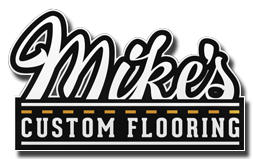Moisture is the number one enemy when it comes to hardwood floors. It causes damage that if left unchecked will require replacing. When it comes to protecting your investment, taking the extra safety steps is crucial and with moisture barriers added to hardwood floors, you can do just that. We at Mike’s Hardwood Flooring would like to take the opportunity to discuss moisture barriers for your hardwood floors.
Best Underlayment & Moisture Barriers for Hardwood Flooring
1) Floating Floor Barriers: Floating barriers are designed to protect floating floor types, like laminate or tile. This option is of the most popular because so many homeowners opt to use wooden tiles and laminate flooring. The barriers used to protect against the moisture in this application are plastic. The plastic barrier is installed before the flooring is installed on top of it. Because the subflooring needs room to breathe, a floating plastic barrier is ideal if you intend to use the wood subflooring. The barriers do not have to be thick being that the flooring will is not nailed or glued down. You should, however, consider using plastic or paper to protect against the moisture that often accumulates in cement subflooring.
2) Glued Floor Barriers: Installed on concrete subfloors, glued flooring barriers protect it from the moisture, particularly during heavy rainfall and excessive humidity. You will need a heavy moisture barrier product in the event you are preparing to glue down your wood flooring to a cement subfloor. These barriers are specially designed to protect your subfloor from sweating during humid days, accumulating water from heavy rain, or accidental liquid spills. An epoxy or resin, the most common type of barrier, helps seal out the moisture and prevent more from soaking through.
3) Nailed Floor Barriers: Nailed wood flooring requires a barrier as well from the subflooring. Protecting the subflooring from getting too much moisture is easily accomplished by installing plastic sheeting on top of the dirt under the subfloor. A special felt paper that helps to eliminate moisture from getting to the topmost layer of flooring can be laid between your subfloor and your new hardwood. This situation requires the two different types of barriers, be sure to keep that in mind during budgeting.
Hardwood Floor Installation & More in Charles Town & Eastern Panhandle of Berkeley & Jefferson Counties in WV | Winchester & Frederick County | Round Hill & Loudoun County | Berryville & Clarke County | Herndon & Fairfax County VA
When selecting the hardwood flooring materials, some flooring options, particularly floating hardwood flooring are already equipped with a built-in barrier. A contributing addition to insulating floors as well as noise absorption, some barriers like cork are a great option. Hardwood floors are an upgrade that expresses luxury and is easily incorporated in nearly any interior design motif. Considering the investment involved, when installing the hardwood flooring most appealing, it is important to take the steps necessary to ensuring it lasts. With the moisture barriers in place, the subflooring and the underside of the wood panels are protected from any seeping moisture. But in addition to installing the various moisture barriers, it is essential you immediately dry any spills that make contact with your floor. Perform routine daily sweeps to keep dirt and granules off the floor to avoid scratches and gouges as well as invest in professional maintenance as frequently as needed. With Mike’s Hardwood Flooring, we are readily available to get your hardwood floors installed and offer any advice or answers to questions to ensure the care of your hardwood flooring. Contact us today!





